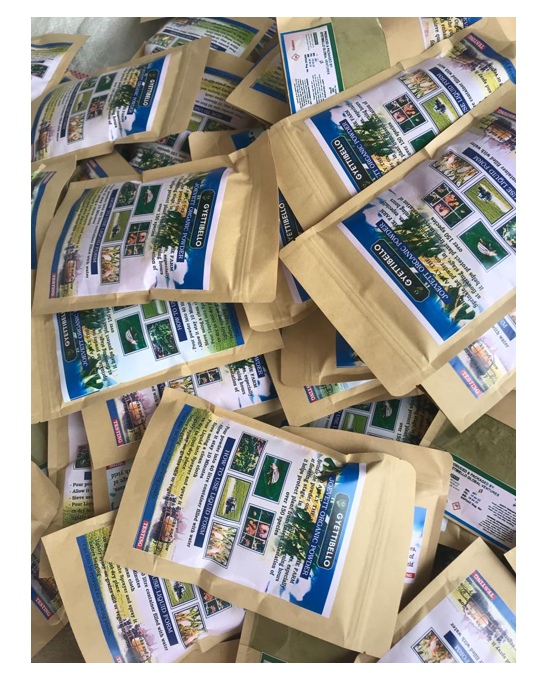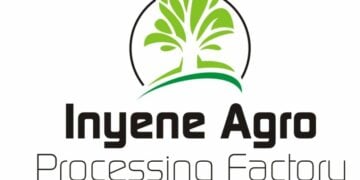Living in a time when the earth is ailing from the effects of climate change, particularly from their effects on agriculture and biodiversity, we constantly battle with changes in rainfall patterns, leading to reduced crop yield, altered planting and harvesting seasons, devastating flooding, and increased pest infestations.
In fact, in the last two years, more than 37.7% of yield loss in agriculture in Northeast Nigeria occurred as a result of flooding and pest infestation, not only during the planting season but also after harvest.
In adaptive response, farmers have invested meagre funds drawn from their profits in synthetic and rather harmful and unsustainable pesticides. The best-case result has farmers succeeding in securing their harvests from pests, but without significant profits afterwards. To survive, the prices of the crops have to increase. The worst-case scenario has whole families wiped out from the ingestion of harmful synthetic pesticides.
In response to this, two emerging companies, Gyettibello Ltd. and Crestmark Ltd., led by Joseph Ngala and Dr. Michael Ibe, combined technical expertise and professional programmatic proficiencies to develop a fully organic pesticide with more than 97% potency, developed from household crops. This innovation birthed Joevett Powder, which has long been approved by NAFDAC and has taken the agricultural industry in the northeast with storm with a potential for scalability across the country and the ECOWAS region.
Crestmark and Gyettibello are emerging consultancy and agricultural companies, respectively, dedicated to promoting sustainable, climate-smart agriculture (CSA) practices across Africa as well as organizational development and capacity strengthening.
Established as cooperative start-ups, the companies aim to address the challenges posed by climate change to agriculture by developing innovative, eco-friendly farming solutions that improve productivity, increase resilience, and reduce environmental impact.

Joevett in packs
This reporter observed that to effectively drive the initiative, the two aforementioned companies formed a strategic partnership aimed at promoting research, which would ensure farmers have access to climate-smart solutions for improvement of yield and soil conservation.
At the core of the mission is the commitment to empower farmers—particularly smallholder farmers—with the knowledge, tools, and technologies needed to adapt to changing climate conditions. They focus on providing scalable solutions that integrate sustainable land management, water conservation techniques, renewable energy, and the use of climate-resilient crop varieties. Combining these practices, farmers are assisted to sustainably increase yields while preserving natural resources.
So far, the partnership has developed and is patenting at least 3 different climate-smart agro-solutions: organic pesticides, fertilizers, and herbicides, both wet and dry blended; trained over 27,565 persons in 12 months on the local production, use, and sale of these products, provided consultancy services to many NGOs, INGOs, companies, and government institutions on the production, training, and deployment of climate-smart solutions. More than 76.3% of the total beneficiaries are rural women.
The partnership also emphasizes inclusivity by promoting gender-sensitive approaches that involve women in every stage of agricultural development. In fostering cooperative models and offering tailored resources for women farmers, they create more equitable agricultural systems.
To carry out their mandate effectively, the partnership currently collaborates and coordinates with community-based organizations at the grassroots level to conduct needs assessments, implement social interventions, conduct organizational capacity gap assessments, facilitate capacity building/organizational strengthening programmes and provide technical assistance, mentorship, and accompaniment to partner organizations as the need arises.
The partnership also collaborates with other agencies, local and international humanitarian organizations, as well as various United Nations member agencies, the relevant Federal and State Ministries, Departments and Agencies especially focusing on agriculture and women’s development.
Since inception, the partnership has successfully managed initiatives, grants, and relationships with diverse stakeholders ranging from governments, United Nations agencies, international aid agencies, and faith and community-based organizations.
With a vision to become a leader in sustainable agriculture, the partnership continues to expand its impact, contributing to both climate mitigation and adaptation while transforming farming communities into resilient, thriving ecosystems. Together, we grow for a greener, sustainable future.
“The indiscriminate use of chemical agents for the storage and preservation of vegetables, cowpeas, and grains by both business owners and small-scale farmers in West Africa has had detrimental effects on both human health and the environment. This has prompted a reevaluation of agricultural practices to mitigate the negative impacts. In response to these challenges, we began introducing homemade organic fertilizers and natural crop protection solutions in 2012, initially focusing on small-scale farming communities in Jos, Kano, Bauchi, Adamawa, Borno, Taraba, and Gombe States. These initiatives have yielded significant success stories, inspiring further innovations and leading to strategic partnerships with major organizations like the UN-FAO,” Dr. Michael Ibe said.
As stated earlier, the partnership patented and duly registered the production of organic pesticides—effectively receiving approval from the National Agency for Food and Drugs Administration (NAFDAC). The interesting feature of the pesticides is that they do not kill the insects; rather, they daze them such that they remain inactive and repelled from the crops or seeds. “In this way, the biodiversity is preserved,” he stated.
The development of the product was conducted by a team of experts led by Joseph Ngala – an Agriculture Extension expert and Dr Michael Ibe – a seasoned humanitarian-development-peace and climate expert, with expertise on rural programming, with support from Aisha Mohammed Hassan, Saidu Inusa.
The efficacy of Joevett Powder Organic Pesticide is measured in the fact that it first penetrates and affects the eyes and the entire body of any living thing making it dormant. It causes discomfort to any insect pest by causing instant writhing and repulsion to the application points by the affected insects, rodents, or animals that are found within the immediate environment where the solution is applied, and living organisms within or around the warehouse, stores, or storage facilities, and on PICS bags or on grain are killed or repelled.
Also, 90% of most insects, rodents and animals do not like substances that are bitter, peppery and toxic. This powder is non-fatal to humans.
The use of chemical for the storage and preservation of vegetables, cowpea and grains by business men and small scale farmers in West Africa has caused a lot of health risks to the consumers of products, as well as wreaked havoc to the environment at large.
The quest by humans to increase output with minimal input through the use of chemical has destroyed so many lives and had negative consequences on the environment. The foods and its products consumed have led to lots of harmful, and sometimes incurable diseases such as cancer, others are ulcer etc.
The other negative effects of the use of these inorganic chemicals include the degradation of the components of the soil, thus resulting in soil erosion which contributes to climate change that is destroying lives and property worth millions of and Naira globally.
In our quest to initiate a solution and to mitigate this unfortunate situation, this led the partnershp to develop the homemade organic fertilizer and natural crop protection called the “Bitter Pepper Solution” starting in 2012. It was used in a small scale in selected communities in Jos, Bauchi, Adamawa, Borno, Taraba and Gombe States with a very impactful result. The trial of the “Bitter Pepper Solution” yielded several success stories.
Further research during which “Superior Bay leaves” was discovered as superior power in controlling insects has resulted in the combination of the materials used in the production of bitter pepper solution thus upgrading it into the Joevett Powder Organic Pesticide which is an “organic solution” to the society. It is one hundred (100%) chemical free with materials sourced locally in home gardens by anyone.
It can be used by both individual, small, medium and farmer cooperatives societies to prevent insect and pest infestation on flowering crops and all types of grains in preserving their quality. The initiative will be accompanied by technologies which will enhance success and sustainability.





